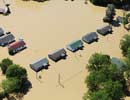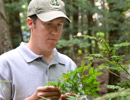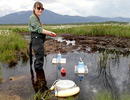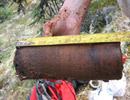
Fall 2014
|
||
|
In this issue of Spheres Online, we highlight the work of four graduate students from the Earth Systems Research Center. From master's to postdoc, their work ranges from forest remote sensing, hydrological computer modeling, and Arctic peatland sampling and analysis. An additional thread weaving their work together is that each of them secured funding through an impressive array of fellowships, scholarships, and employment to make it all possible. In understanding the Earth as an integrated system, the ESRC explores the physical, chemical and biological processes that shape Earth's environment, with an emphasis on the unique role of humans as agents of change. Formerly known as the Complex Systems Research Center, ESRC brings together ecologists, environmental chemists, Earth system modelers, and remote sensing scientists to study natural and human-induced changes in the Earth's water, carbon, and nitrogen metabolism. ESRC graduate education programs encourage interdisciplinary approaches to understanding environmental change. "Graduate students play a central role in ESRC, far beyond just doing all the heavy lifting on projects dreamed up and planned by their advisors," says tropospheric chemist and ESRC director Jack Dibb. "In most cases, students are pointed toward important and complex questions and encouraged to find an aspect of the problem that intrigues them. As advisors, we mainly need to ensure they tackle manageable projects that allow real progress to be made in a few years, since complete understanding of the systems we are all interested in requires careers of dedication by a large multi-disciplinary community. With each ESRC thesis or dissertation we make small steps forward, but most importantly we create a new member of the community ready to follow up and make the next step, and soon begin mentoring their own future colleagues." Upcoming issues of Spheres Online will similarly highlight the Space Science Center and the Ocean Process Analysis Laboratory and their graduate students. | ||
Earth Systems Science
A River Runs Through It
PH.D. CANDIDATE Danielle Grogan's scientific career was cemented by her undergraduate research experience at Smith College, where she majored in mathematics and minored in geology. Her research project involved a little campus pond that perpetually filled with silt and had to be dredged every few years. Grogan was tasked with figuring out why, and thereafter was hooked on the hydrologic-human cycle. Read More… |
||
Earth Systems Science
Pinpointing a Pint-sized Pest From On High
IT WOULD SEEM like the very definition of looking for the proverbial needle in the haystack: using satellites to hone in on a 1/16-of-an-inch—about the size of the period at the end of this sentence—aphid-like insect under the forest canopy before visible signs of its destruction appear. Read More… |
||
Earth Systems Science
Have Funding, Will Travel
BELMONT, MASS. native Sophia Burke's decision to come to UNH in September 2009 was pretty much a no-brainer. "I started my search looking for a small liberal arts college where I could major in environmental sciences-ecosystems. When I discovered that many such schools didn't have environmental science programs of the same caliber as UNH the choice became very clear," says Burke... Read More… |
||
Earth Systems Science
Carbon Bomb with a Long Fuse
CLAIRE TREAT funded the bulk of her Ph.D. work by winning a graduate fellowship from the Department of Energy Office of Science for her proposal titled “Future of soil carbon in permafrost regions: The great northern carbon bomb?”
|
||
|
Around the Hall
News and Notes
• Faculty, Staff, and Student News
Read More… |



